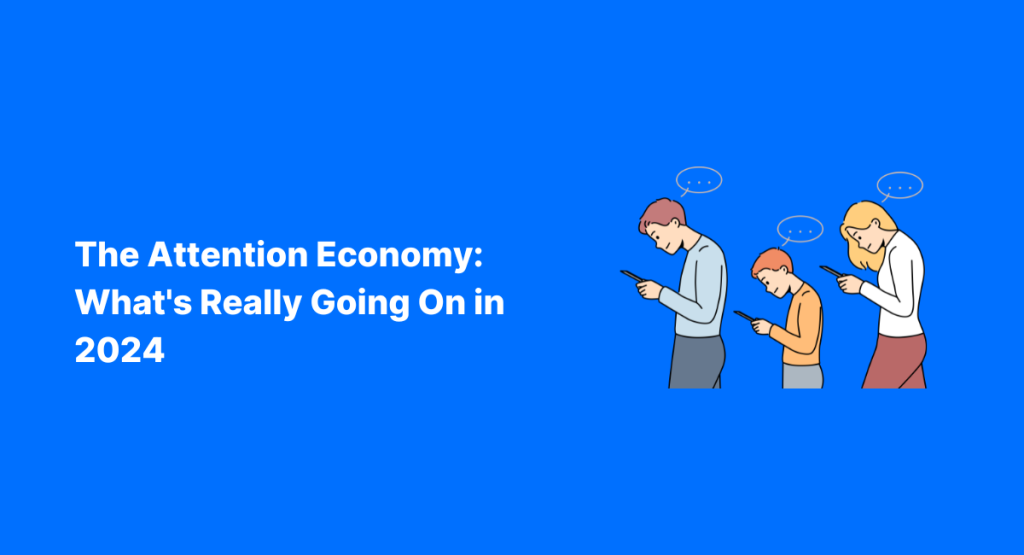Ever wonder why you can’t stop scrolling through TikTok but can’t focus long enough to read a book? Welcome to the attention economy, where your focus is more valuable than gold, and everyone’s fighting for a piece of your mental real estate.
Let’s cut through the noise and understand what’s really happening.
1. Why Your Attention Is the New Oil
Here’s what makes your attention so valuable:
- The average person sees 10,000+ ads per day
- Companies spend billions to grab your focus
- Every click, like, and share is monetized
- Your attention directly converts to profit
Pro Tip: Track your screen time for a week. Those hours are exactly what companies are fighting for.
Red Flag: If you’re not paying for the product, you (and your attention) are the product.
2. The Real Players in This Game
It’s not just social media – it’s an entire ecosystem:
- Tech giants (Facebook, TikTok, Google)
- Content creators and influencers
- Traditional media fighting for relevance
- Apps and games designed for addiction
- Brands trying to stay visible
Pro Tip: Notice which platforms you unconsciously open when bored. That’s engineered behavior.
Red Flag: If a platform makes you feel anxious when you’re not on it, that’s by design.
3. How They’re Actually Getting Your Attention
The tricks aren’t subtle anymore:
- Infinite scrolling (there’s never a natural stopping point)
- Push notifications (psychological FOMO triggers)
- Personalized content (AI-driven addiction)
- Social validation (likes, comments, shares)
- Variable reward systems (like slot machines)
Pro Tip: Turn off all non-essential notifications. Watch how many apps try to lure you back.
Red Flag: The more “personalized” something feels, the more data it’s collecting about you.
4. The Real Cost of “Free” Entertainment
Here’s what you’re actually paying with:
- Decreased attention span
- Increased anxiety and FOMO
- Reduced deep thinking ability
- Personal data and privacy
- Real-world relationships
Pro Tip: Schedule “deep work” sessions with all notifications off. Notice how hard it is at first.
Red Flag: If you can’t go an hour without checking your phone, you’re deep in the attention economy trap.
5. The Dark Side No One Talks About
The attention economy is creating:
- Digital addiction by design
- Echo chambers and polarization
- Shortened attention spans
- Mental health issues
- Privacy concerns
Pro Tip: Use apps like Forest or Freedom to block distracting sites during work.
Red Flag: If you’re comparing your life to what you see online, remember it’s all curated content.
6. How Businesses Are Adapting
Smart companies are:
- Creating shorter, punchier content
- Using multi-channel approaches
- Focusing on micro-moments
- Building authentic connections
- Respecting user attention spans
Pro Tip: The best marketing doesn’t interrupt – it adds value.
Red Flag: If your content strategy is “post more often,” you’re part of the problem.
7. Taking Back Control
Here’s how to manage your attention:
- Set specific times for social media
- Use focus apps and website blockers
- Create technology-free zones
- Practice digital minimalism
- Choose quality over quantity
Pro Tip: Start with a 24-hour digital detox. Notice what makes you anxious about disconnecting.
Red Flag: If you can’t remember what you scrolled past 5 minutes ago, it’s time for a break.
Real Results from Managing Attention
Here’s what happens when you master the attention economy:
- Companies see 40% higher engagement with focused content
- Individuals report 30% better productivity
- Teams experience better collaboration
- Customers appreciate respectful marketing
Ready to navigate the attention economy without losing your soul? At Innovista Marketing Agency, we create marketing that respects attention while delivering results.
Get Your Free Attention Audit and discover how to make the attention economy work for you, not against you.
Remember, in a world fighting for attention, the real winners are those who know how to give it back.


